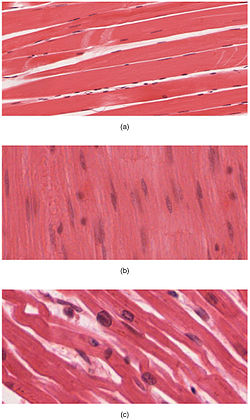How do muscle cells differ from nerve cells?
1 Answer
Muscle cells and nerve cells (neurons) are two very different types of cells.

Muscle cells (myocytes) contract to produce movement while nerve cells send messages from receptor cells to either glandular cells or muscle cells relaying messages throughout the body.
While nerve cells are involved in the transmission of neural synapses (hence the name), myocytes contract to move the skeletal bones and move the body. Muscle cells can be smooth (visceral), cardiac, or skeletal. Smooth muscle cells make up the internal structure of organs, skeletal muscle cells attach to bones to provide movement, and cardiac muscles provide the involuntary "pumps" necessary to circulate blood through the body. Shown below are smooth muscles (B.), cardiac muscles (C.), and skeletal (A.).

Another critical difference between nerve cells and muscular cells is their anatomy. Neural cells are composed of a series of somatic cells (main receiver) connected to each other by rows of axons (the road system, if you will). The dendrites attached to the somatic cell receive electrical impulses from other dendrites by means of electrical synapses. Basically, synapses are gaps between cell bodies that are linked via gap junctions (small channels) or paracrine chemical signaling. Muscular cells, on the other hand are composed of semi-structured rows of specialized cells, which together use endocrine and paracrine signaling to contract in simultaneous fashion.
The possible confusion may lie in the commonality of their internal cellular structure. This is due to their origin from the stem cells of embryos in the first trimester. In this juncture of development, unspecialized cells receive chemical "designators" that determine their specialty and function in the body. In essence, the early body is similar to a despotic government, where the "citizens" are assigned jobs by the main body (no pun intended). Your question is quite reasonable in regards to cellular function, and now you should be able to differentiate between the two cell types easily with new knowledge of the origin of muscular and neural cells.
The question that you ask is not one that can receive a simple answer, however the combined efforts of some of us in this article hopefully covers the major differences between nerve and muscular cells.


